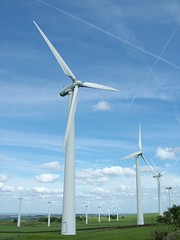
Small Business Owners: Clean Energy Economy Will Increase Prosperity
9/27/2011
 A poll of small business owners conducted by the Small Business Majority reveals strong support for clean energy solutions as one important element leading to innovation, economic growth, and job creation. Huge majorities support "bold" environmental initiatives to increase fuel efficiency and support the U.S. Environmental Protection Agency's (EPA) regulation of carbon emissions.
A poll of small business owners conducted by the Small Business Majority reveals strong support for clean energy solutions as one important element leading to innovation, economic growth, and job creation. Huge majorities support "bold" environmental initiatives to increase fuel efficiency and support the U.S. Environmental Protection Agency's (EPA) regulation of carbon emissions.
The poll was conducted in July and released on Sept. 20. The report on the findings, Small Business Owners Believe National Standards Supporting Energy Innovation Will Increase Prosperity for Small Firms, illustrates the clear disconnect between the Capitol Hill rhetoric about business support for reducing regulations and the real problems facing small business owners. Among the notable findings:
- An overwhelming majority, 86 percent, "believe Washington doesn’t understand how small business works and doesn’t provide them help."
- "Economic uncertainty and rising costs are hurting small business more than taxes and regulation." Only 13 percent agree with the notion that regulations were the biggest problem for small businesses, while only 23 percent think that taxes are the main problem. Instead, the real problems are economic uncertainty (46 percent) and the rising costs of doing business (43 percent).
- Innovation and efficiency are the keys to small business survival. Eighty-seven percent of respondents believe that innovation, fuel efficiency, and energy efficiency are good ways to stimulate economic growth and create prosperity. The poll asked specific questions about fuel efficiency and changes in the automotive industry and by wide margins, the respondents believe the government and the auto industry should be doing more to increase efficiency and drive innovation.
Reinforcing the points they made in the survey, many business owners are countering rising costs by embracing energy efficiency with actions such as installing efficient lighting, reusing materials, and more.
The report comes on the heels of other recent reports that debunk the political rhetoric about the causes of the economic problems the country is facing. For example, the National Association for Business Economics (NABE) found in an August survey that a large majority of business economists have a positive perspective on the regulatory environment, contradicting the overheated, anti-regulatory rhetoric coming from Big Business lobbyists.
According to these NABE respondents, many of whom work hands-on in the business world, the watchword "uncertainty," when used by many businesses, refers to anxieties over the weak economy, not so-called "regulatory uncertainty." Nearly 75 percent of survey respondents said that "once the economy starts to improve, such anxieties will go away." Eighty percent of survey respondents felt that the current regulatory environment was "good" for American businesses and the overall economy. NABE also noted, "The majority of survey respondents indicated that while uncertainty might be a concern, it is not a major one."
The Political Economy Research Institute (PERI), affiliated with the University of Massachusetts, Amherst, in conjunction with CERES, published in February a report analyzing the job creation impact of two new EPA clean air rules. (CERES is a coalition of investors, environmental groups, and other public interest organizations that invest in sustainable economy projects.) The two rules PERI examines in the analysis are the Clean Air Transport Rule (finalized in July as the Cross-State Air Pollution Rule) and the National Emissions Standards for Hazardous Air Pollutants for Utility Boilers (known as the “Utility MACT” rule).
According to the report, investments in pollution control and generating capacity could result in nearly 1.5 million jobs over five years, from 2010 to 2015. The report breaks down by 36 eastern states the numbers of jobs in new construction, operating and maintenance, and from retirements. The economic benefits from these jobs are substantial; the report does not include calculations of the benefits from better health and cleaner air.
A Sept. 19 report by the Economic Policy Institute (EPI), entitled The Combined Effect of the Obama EPA Rules, also debunks anti-regulatory rhetoric by showing that new EPA rules "will be of tremendous benefit to public health, and the combined compliance cost of the rules – both finalized and proposed – amounts to only about 0.1 percent of the economy, and thus are not a significant factor in the overall economy’s direction," according to EPI's press release. The report analyzes several proposed rules targeted by the House in coming weeks and, as EPI showed in earlier reports, the benefits of these rules far outweigh the costs imposed on polluting industries.
The evidence is clear: the American people do not have to choose between job creation and protecting their families and communities from environmental, workplace, and consumer product hazards. American businesses can adapt to new standards; they’ve been doing it for decades. They know they have to continually evolve to survive and grow. Attempts by Congress to dismantle the regulatory system will do nothing to create jobs now and would very likely cost American businesses the jobs and industries of the future.
Image in teaser by flickr user nualabugeye, used under a Creative Commons license.


